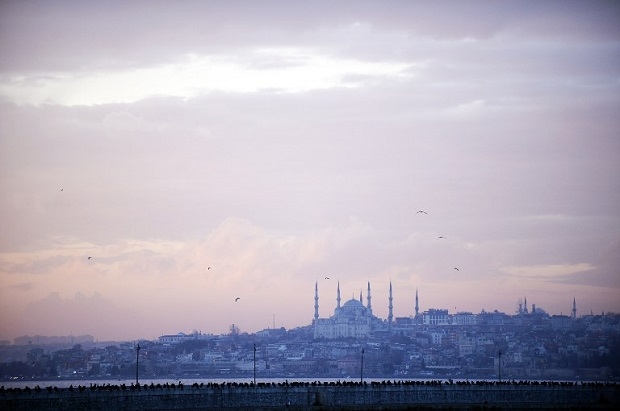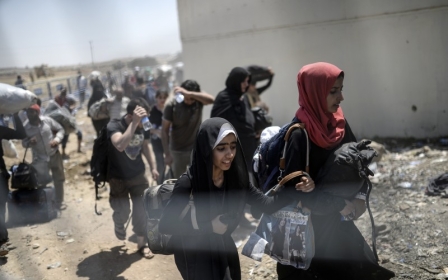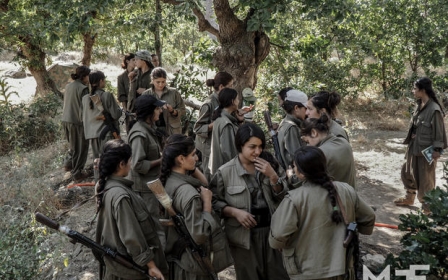The many faces of Turkey’s economic miracle

ISTANBUL, Turkey - The rapid economic growth of the last decade, dubbed by many as the Turkish economic miracle, has led to a proliferation of glitzy shopping centres purveying luxury designer goods, dazzling skyscrapers offering high levels of residential comfort, fine dining options and an increase in the number of top-end automobiles plying the roads of Turkish cities.
But none of this means anything to Abdurrahman, who works for minimum wage as a cleaner at a hospital in Istanbul. He faces a daily uphill struggle to provide even the basics for his family of six.
The Turkish economy experienced lift-off and hit growth rates as high as 9.2 percent in 2010, in the wake of economic, political and structural reforms implemented in the early 2000s. Although the economy has since cooled with current growth rates closer to around three percent, one characteristic of this rapid progress has been the increasing visibility of the divide between those who have benefitted and those left behind.
Abdurrahman earns a monthly wage of roughly 1,000 Turkish liras ($339), and has to provide for his wife and four school-aged children.
“You can see the greed and ambition increase daily amongst people who are always looking for more, but what can I do? I am happy if I can take home a loaf of bread and some cheese for my family most evenings,” said Abdurrahman.
Yet he is one of the fortunate few. He is insured and also doesn’t have to pay rent since he lives in a flat owned by his brother. There are an estimated five million people working for minimum wage in Turkey, according to data from the Revenue Department. There are plenty who work in the informal economy and are denied even basic workplace protections such as insurance, which would, among other things, make them eligible for a state pension later in life.
“It is impossible to get by on minimum wage," Abdurrahman told Middle East Eye. I do additional work as a mover on my off days and my wife also tries to get cleaning jobs and childcare work to supplement our income, but even then it is not enough. It is a struggle."
“I can’t even afford to take my children to shopping centres to window shop and have a bit of recreation. Sometimes I am ashamed to look my children and wife in the eyes.”
He said it would be impossible for his family to survive if not for the occasional assistance provided by his in-laws, adding that he is also no longer eligible for the random aid provided by the municipality and the district governor’s office since he has a job that gives him insurance.
While Turkey has a healthcare system that surpasses even those of some developed countries, and provides free education, low-income families still face considerable hardships.
“Our president keeps on urging people to have more children, but providing for them is not easy and the support provided by the state not enough,” Abdurrahman said. He added that just paying for public transportation for his children to travel back and forth from school puts a strain on his family, let alone various associated costs like stationary and other needs.
“Were it not for the conscience of a few good-hearted people who help me out from time to time, I don’t know what I would do. As it is, my family hasn’t tasted red meat in such a long time. I don’t even know what that costs because there is no point in looking it up. Once in a while I can afford to buy chicken for my family, which is less expensive than red meat, but it hurts me that my children are deprived of such things,” said Abdurrahman.
“I am not ungrateful though. I know there are people far worse off than me. They either can’t even find work or are in jobs that don’t even give them the benefits I get.”
This is a common story in Turkey, where it is often the community rather than state institutions that try to help out those in need. One example is the system local bakeries use to provide bread to those who can’t even afford that.
Bakeries have a blackboard listing the number of loaves of bread that have been handed out at no cost to those in need. The bakery is then compensated by people paying for more loaves of bread than they actually purchase.
Benefiting from the boom
Ibrahim Sapan, on the other hand, has reaped the benefits of the gold rush of the past decade and expanded his business empire. A lawyer by training, Sapan, 40, first became actively involved in his family’s jewellery and currency trading business and has since expanded into 10 different fields ranging from construction to information technology.
“The reforms and transparency introduced by the government after 2002 gave me and a lot of others the confidence to embark on entrepreneurial ventures and be successful in our work,” said Sapan, adding that his success is solely due to having a sound business and the political climate in the country.
Sapan said although his political leanings are toward President Recep Tayyip Erdogan's Justice and Development Party (AKP), his business enterprises have nothing to do with government tenders and privatisation projects. He is, however, keen to stress that it was the trustworthiness of the government that motivated him to put his money into various business ventures.
“The secularist circles that ran the country previously couldn’t stomach conservatives becoming successful and were therefore happy for the country to just hobble along as long as their own small elite kept themselves in the money,” he said.
The growing visible divide between different sections of society is not due to inconsiderate policies of the government, according to Sapan, who insists that any existing divide in the country is not between rich and poor, but actually an ideological one.
“I am not saying everything is great, but the situation is much better for everyone now. More successful businesses mean more employment opportunities and progress. Almost everyone was faced with misery before, except for the few elites. It might have been less visible but it was actually far worse. The playing field has now been levelled,” said Sapan, adding that the country has not completed its industrialisation process yet because of the stalemate it has had to endure since the 1920s.
Sapan, who is now considering a future in politics, believes accusations that the government is extremely pro-business to the detriment of workers' rights is unfair.
“The minimum wage is just one dimension and it is not even something that the government can unilaterally decide to change. Global market conditions also matter. Our businesses need to stay competitive. Every citizen in the country has access to free healthcare and education. As a businessman I am against increasing the minimum wage because it will hurt business.”
His first foray into politics came in the run-in to the 7 June general elections, where he sought to become a candidate for parliament but did not succeed.
“I am well-off and will not be entering politics for money. I want to give back to society now that I have succeeded. This government paved the way for us conservatives, who make up most of the population, to become successful. Now I want to be a part of the new young faces who will carry this tradition forward,” he said.
Luxury spending rises
A recent report by Deloittes shows the growth trend of the luxory sector in Turkey despite a stuttering economy, rising unemployment and inflation.
The report foresees the luxury segment market growing to 7bn liras ($2.4bn) by 2018 despite a slowdown in the economy.
According to Erhan Aslanoglu, a professor of economics at Istanbul’s Piri Reis University, the continuation of luxury spending despite a contracting economy shouldn’t come as a major surprise in economic terms, but he also stresses the need to look into the sociological and psychological factors behind it.
“High-income groups will continue to spend. They are less likely to be affected in the short term. Middle-income groups will also continue spending. People in middle-income countries like Turkey have a propensity to spend,” Aslanoglu told MEE.
“Of course we also need to consider other issues such as the notion that consuming luxury brands bestows increased social status and that the Turkish propensity to consume is high. We also shouldn’t forget that a lot of these luxury brands target wealthy Middle Eastern tourists, hence their high visibility,” said Aslanoglu.
When it comes to income inequality, Aslanoglu believes it is a global problem affecting developed countries as well, and that Turkey is no exception.
“There is no doubt that income disparity is a problem for Turkey and being a middle-income country makes the contrast starker, but we can’t deny that compared to 15 years ago the situation has actually improved slightly. This can be seen via the Gini coefficient that has improved to 0.43 from 0.48 in this time,” said Aslanoglu.
The Gini coefficient measures the extent to which the distribution of income or consumption expenditure among individuals or households in an economy deviates from a perfectly equal distribution.
In Aslanoglu’s view, the two main factors for this decrease are that Turkey no longer has the high interest rates accompanied by inflation of the past that used to put high-income groups at an advantage, and also the fact that during its first two terms in power the AKP government provided a lot of subsidies to lower-income groups.
“Steady economic growth meant that per capita income rose from $3,000 in 2002 to $10,000 now. This might decline slightly now given that Turkey risks falling into a middle-income trap, but growth is still the best way to address income inequality,” said Aslanoglu.
Aslanoglu said that one of the few things that makes it slightly easier for low-income groups in Turkey these days is the prevailing culture where community and family-based support networks are strong and often come to the rescue.
In the end, economic indicators and trends do not mean much to Abdurrahman and the millions of others like him who face the daily grind of putting bread on the table.
“All this chasing after wealth means that as usual everyone has forgotten the poor people in the country. We are invisible to them all.”
Middle East Eye propose une couverture et une analyse indépendantes et incomparables du Moyen-Orient, de l’Afrique du Nord et d’autres régions du monde. Pour en savoir plus sur la reprise de ce contenu et les frais qui s’appliquent, veuillez remplir ce formulaire [en anglais]. Pour en savoir plus sur MEE, cliquez ici [en anglais].




